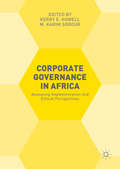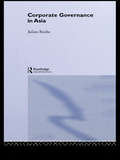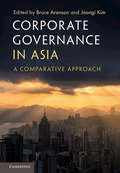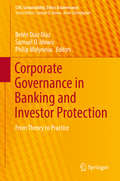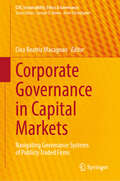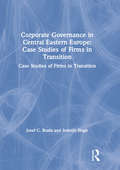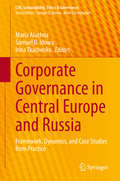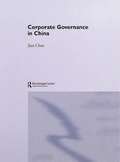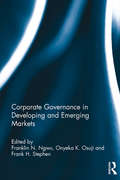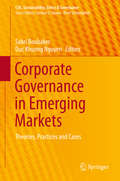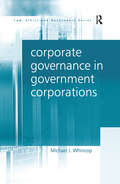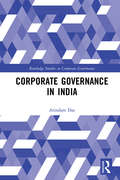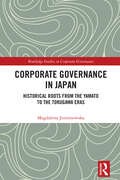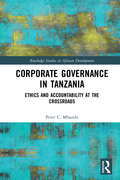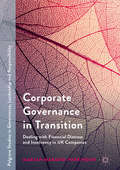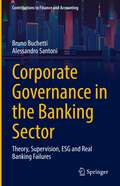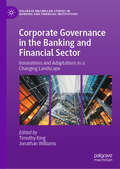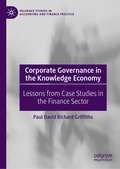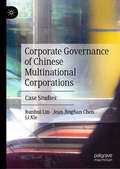- Table View
- List View
Corporate Governance in Africa (Routledge Studies on Law in Africa)
by Victor EdiagbonyaThis book discusses the issue of limited stakeholder recognition and protection of stakeholder interests within the Anglo-Saxon corporate governance model practised in many sub-Saharan African countries.The volume argues that the relative success of the Anglo-Saxon model in developed economies is attributed to the presence of functional institutions, such as effective legal systems, active external markets for corporate control, and organised civil societies, among others. Many African countries, such as Nigeria and South Africa, have adopted the UK corporate governance framework despite facing challenges occasioned by an inefficient legal system plagued by systemic corruption. Given the challenging institutional contexts in African countries, this book proposes an alternative corporate governance framework – the functional stakeholder model (FSM) – for the banking industry in countries facing similar institutional challenges; the FSM aims to promote stakeholder recognition and the protection of stakeholders' interests. The book draws on stakeholder and institutional theories in designing an alternative corporate governance model, the ‘FSM’ for banks operating in challenging institutional contexts.The book will interest regulators, bankers, auditors, academia, policymakers, and researchers in comparative corporate governance and financial regulation, especially banking regulation and stakeholders in developing and emerging markets.
Corporate Governance in Africa: Assessing Implementation and Ethical Perspectives
by Kerry E. Howell M. Karim SorourUsing a range of case-studies, thisbook analyzes corporate governance relationships between several Africancountries and the international community, providing an ethical assessment ofissues surrounding globalization and adherence to external governancemechanisms. Employing a methodological approach, Corporate Governance in Africa critiques occidental perspectives ofcorporate governance in relation to the needs of separate states, and thecontradictions that arise when local cultures are not taken in toconsideration. With case studies from Egypt, Ghana, Nigeria, South Africa,Kenya and The Gambia the book presents a comprehensive view of North, East,West and South Africa with contributions from global experts in the field. Theauthors critique the transformations deemed necessary for governance proceduresin order to facilitate confidence and inward investment for these Africanstates.
Corporate Governance in Asia
by Julian RocheThe impact of the economic downturn and the increase in financial scandals emerging from major corporations has generated a growing interest in governance issues and has emphasized the need for companies to be transparent in their dealings with shareholders and the markets. Although the issues in Asia are fundamentally similar to those in the rest of the world, there are some crucial differences in the way in which Asian corporations acknowledge and confront these issues and in the political and legal frameworks under which they operate. Using examples of good and bad governance, Roche analyzes if the Asian approach to governance issues is unique. Business and finance students, as well as executives with an interest in Asian business or corporate governance will find this an authoritative and insightful guide to this complex and important topic.
Corporate Governance in Asia: A Comparative Approach
by Bruce Aronson Joongi KimCorporate governance in Asia continues to attract global interest due to its critical importance to the world's fastest-growing region. The study of governance systems remains complicated by Asia's mix of legal traditions, market systems and social history. This comprehensive textbook provides a comparative overview of the corporate governance framework, theory and practice in major Asian countries. Students at all levels will gain an understanding of corporate governance systems in Asia and how they compare with models attributed to the US, the UK and Europe. Featuring six foundational chapters focusing on general theory and corporate governance systems and eight country-specific chapters, this book can be used as the basic textbook for a general course on comparative corporate governance or as an essential reference about corporate governance in Asia for a wide variety of professionals including academics, jurists, students, practitioners, investors, creditors, policymakers and analysts.
Corporate Governance in Banking and Investor Protection: From Theory to Practice (CSR, Sustainability, Ethics & Governance)
by Samuel O. Idowu Philip Molyneux Belén Díaz DíazThis book explores the status quo of corporate governance in banking and investor protection from both theoretical and practical perspectives. Bringing together original conclusions with a regional and international focus, it provides a timely and comprehensive overview of the effectiveness of corporate governance in the financial sector and an assessment of investor protection. It also includes a number of examples and case studies to illustrate the findings. The book compares corporate governance in the banking and financial industries before and after the financial crisis, and helps to evaluate the effect of the recommendations and regulations that have been developed in the interim.
Corporate Governance in Capital Markets: Navigating Governance Systems of Publicly Traded Firms (CSR, Sustainability, Ethics & Governance)
by Clea Beatriz MacagnanThis book provides a comprehensive and systematic analysis of corporate governance structures in a diverse set of countries. It offers a global perspective on how different governance systems operate in different legal, cultural, and economic frameworks. The book focuses on publicly traded organizations listed on the capital markets of Australia, China, Germany, Hong Kong, Italy, India, Japan, Russia, Singapore, and Spain, providing an understanding of the institutional systems that guide corporate governance in these countries. This book serves as a resource for professionals, corporate consultants, students, and academics in the field of business, and institutional policymakers in the capital markets and corporate controllers.
Corporate Governance in Central Eastern Europe: Case Studies of Firms in Transition (Microeconomics Of Transition Economies Ser.)
by Inderjit Singh Joseph C. BradaThis volume focuses on the performance of firms as a measure of the effectiveness of corporate governance, and then attempts to draw conclusions about the relative advantages of different ownership structures. The analysis is based on studies of firms in the Czech Republic, Hungary and Poland.
Corporate Governance in Central Europe and Russia: Framework, Dynamics, and Case Studies from Practice (CSR, Sustainability, Ethics & Governance)
by Samuel O. Idowu Maria Aluchna Irina TkachenkoThis book examines corporate governance through a holistic lens that integrates financial, social and environmental goals, e.g. increasing transparency and disclosure. In addition, it investigates the theoretical assumptions guiding the current corporate governance practices adopted by companies in Central Europe and Russia. The book presents a dynamic study on the evolution of corporate governance systems, which were practically non-existent just 30 years ago. In turn, it addresses criticism leveled at corporate governance, its impact on the outbreak of the financial crisis, and recommendations for changes after the crisis. The book employs a regional focus, exploring a group of countries that have often been neglected in corporate governance research. Carefully selected data and a variety of case studies prepared by leading authors from the region provide evidence to support the analysis.
Corporate Governance in China (Routledge Studies on the Chinese Economy #Vol. 9)
by Jian ChenBased on extensive original economic analysis, Chen examines key questions relating to corporate governance in China, including the relationship between ownership structure and corporate performance, the determinants of capital structure, and the nature of contemporary governance structures. It concludes that corporate performance is positively related to ownership concentration, but negatively related to state ownership, and that contemporary corporate governance structures are heavily dependent on previous structures in the centrally-planned economy and on the path of transition to the market economy.
Corporate Governance in China: The Structure and Management of Foreign-Invested Enterprises Under Chinese Law (China Law, Tax & Accounting)
by Giovanni PisacaneThis book provides useful tools and information to help readers understand the key factors involved in organizing, structuring and managing a company in China. It achieves this by focusing on the critical issues that foreign investors and professionals encounter in China and using a clear and practical overview of Corporate Governance, Structure and Management of Foreign-Invested Enterprises under Chinese Law following the introduction of the 2015 Draft Foreign Investment Law. This latest reform project will likely have a major impact on the investment landscape, as it calls for the replacement and unification of the three Foreign Investment Laws currently in place, resulting in important changes in the legal framework governing foreign investments. The book examines company structures, together with their functions and relevant liabilities. Further, it addresses the respective positions held in a company in order to better understand the stakes each holds in Corporate Governance: the shareholders, legal representative, board of shareholders, board of directors, board of supervisors and the general manager. Unique aspects of the Chinese company system are also highlighted, such as company seals, shareholders' rights and potential company deadlock. As such, the book represents an essential overview of the current concerns regarding Corporate Governance in China, offering readers a broad perspective on the Chinese legal system and answers to the most frequent questions that arise.
Corporate Governance in Developing and Emerging Markets
by Franklin N. Ngwu Frank H. Stephen Onyeka K. OsujiThroughout the world, the Anglo-American model of corporate governance tends to prevail – but no two countries are identical. Governance outcomes in developing and emerging economies often deviate from what theory predicts, due to a wide range of factors. Using insights from New Institutional Economics, Corporate Governance in Developing and Emerging Markets aims to explain the different issues and cultural and legal factors at play, and put forward an alternative governance framework for these economies. Structured in three parts, this text investigates different models of corporate governance; it explores the realities of corporate governance in ten nations, including the ‘BRICS’ (Brazil, Russia, India, China and South Africa) and ‘MINT’ (Mexico, Indonesia, Nigeria and Turkey) countries; and then considers corporate governance reform. This interdisciplinary text will be a valuable tool for students of corporate governance across Business, Economics and Law; and an equally useful resource for anyone working in or carrying out research in this area.
Corporate Governance in Emerging Markets: Theories, Practices and Cases (CSR, Sustainability, Ethics & Governance)
by Duc Khuong Nguyen Sabri BoubakerThis book fills the gap between theories and practices of corporate governance in emerging markets by providing the reader with an in-depth understanding of governance mechanisms, practices and cases in these markets. It is an invaluable resource not only for academic researchers and graduate students in law, economics, management and finance but also for people practicing governance such as lawmakers, policymakers and international organizations promoting best governance practices in emerging countries. Investors can benefit from this book to better understand of these markets and to make judicious investment decisions.
Corporate Governance in Government Corporations (Law, Ethics and Governance)
by Michael J. WhincopMany governments across the world have responded to the need for greater efficiency in the delivery of government services by the reorganization of these bureaucracies along the lines of for-profit business corporations. In doing so, governments have relied on the capacity for governance practices to overcome the weaker incentives created by the attenuated 'property rights' that are created in public enterprise.
Corporate Governance in India (Routledge Studies in Corporate Governance)
by Arindam DasThis book looks at how we can promote better governance practices in business organizations of developing economies. It presents a mix of conceptual perspectives and observations on corporate governance practices in a concise manner and illustrates through empirical evidence drawn from the Indian business environment. The secondary data analysis provides insights into Indian firms' corporate governance practices. This book is a useful reference for anyone who wishes to identify leading practices and develop broad recommendations applicable to corporate governance practices in developing economies in general.
Corporate Governance in Japan: Historical Roots from the Yamato to the Tokugawa Eras (Routledge Studies in Corporate Governance)
by Magdalena JerzemowskaThe roots of corporate governance are rarely looked for in the ancient history of countries. Literature pays not enough attention to the impact of the country’s history on the relations between economic actors and owners, known today as corporate governance. Many countries are guided by centuries-old traditions and customs, which is especially true of Japan. Japan is of particular interest because history of its corporate governance is not widely known and because it has developed a unique corporate governance model. This book aims to diagnose and trace the causes and symptoms of this uniqueness, emphasizing that it is a lasting legacy of previous eras. It examines key political, social, cultural, and economic events in Japan from its dawn till the 17th century in a comprehensive way and in the cause-and-effect aspect, combining the history, economic history, and the history of corporate governance. It refers to little-known issues considered in the context of a very interesting and successful country and economy, which may arouse the desire to expand knowledge and learn about the roots of these successes. The innovative nature of the research goal and the simplicity of presentation are the advantages of this book.
Corporate Governance in Tanzania: Ethics and Accountability at the Crossroads (Routledge Studies in African Development)
by Peter C. MhandoIncreasingly the importance of corporate governance for economic development in developing economies like Tanzania is indisputable. This book explores the effectiveness of corporate governance in Tanzania and asks how it can be further developed and improved so as to make a difference in the contribution of state-owned enterprises to the economy. The book tries as fairly as possible to probe further into effective corporate governance, using cases of public entities, highlighting shortfalls in their governance and the consequent multiplier effects on socio-economic life. On the other hand, the book also aims to present examples of good governance in multi-layered ways, to show that there is room for creativity and innovation in applying principles of good corporate governance. Recognising that context is crucial, the book starts by assessing Tanzania’s socio-historical and economic context, and gauging various applicable metrics. Using historical and theoretical lenses, including the ethics-accountability relationship, the author aims to improve our understanding of corporate failures and consequent waste in Tanzania. Explaining failures in governance is far from straightforward, as by definition they operate beyond rules and regulations, systems and processes, yet the author draws from decades of local experience and expertise in order to assess the real situation on the ground. The Tanzania case will be of considerable interest to researchers looking at questions of corporate governance and economic development both within the country itself, and across Africa.
Corporate Governance in Transition: Dealing With Financial Distress And Insolvency In Uk Companies (Palgrave Studies In Governance, Leadership And Responsibility Ser.)
by Marjan Marandi ParkinsonThis book presents an account of legal, economic and managerial perspectives on governance in situations of financial distress and insolvency. It uses detailed real-life case studies of executive decision making to explore and illustrate the discussion. The book deals with the emergence of corporate governance as a framework of checks and balances on executive decision-making, before moving to the core issues of governance during financial distress and insolvency and alternative informal and formal rescue. Identifying and reviewing turnaround strategies and formal rescue processes available to management, the book also examines the increasing importance of creditors and their impact on business decision-making. The book provides a detailed interpretation of governance in five mega insolvencies in retail and construction following the financial crisis in 2008. It also sets out a methodology which is designed to inform and help those readers seeking to analyse and interpret director behaviour in such circumstances.
Corporate Governance in the Banking Sector in China (CSR, Sustainability, Ethics & Governance)
by Weikang ZouFocusing on the dichotomous and comparative analysis of the legitimacy, paradigm, and operating frames of bank governance and its reproduction in the new financial regime following the global financial crisis, this book examines in depth how corporate governance in bank institutions is legitimized, justified, and delivered in diversified financial models and their influences on the Chinese banking industry. By combining this type of financial model analysis with the new institutionalism theory, the book lifts the mysterious veil from corporate governance in Chinese banking institutions with regard to its establishment and constant changes. Through a kaleidoscope lens and by conducting a “layer by layer” diagnosis, the book tells the “background stories” of the complex settings for Chinese financial institutions, asks and answers the paradigmatic question of for whom banks are actually run and governed, and mind-maps the main corporate governance mechanisms and practices prevalent in Chinese banks.
Corporate Governance in the Banking Sector: Theory, Supervision, ESG and Real Banking Failures (Contributions to Finance and Accounting)
by Bruno Buchetti Alessandro SantoniThis book gives an overview of the most important theories on Corporate Governance, investigating the myth and the reality of it. It argues that within the banking sector exist two new agency costs (i.e., bank depositors and shareholders vs. directors and bank depositors vs. shareholders and directors). These agency problems are difficult to reduce for two reasons. First, banks are complex and opaque. Second, government implicit guarantees and the deposit insurance systems reduce the monitoring of depositors. This book also takes a deep dive into research on CG in the banking sector via a unique and innovative literature review covering the time period between 2000-2020. It finds that some specific CG characteristics affect banks: risk appetite, performance, accounting quality, compensation and corporate social responsibility disclosure. Furthermore, this publication contends that institutional investors are changing CG for the better, describing how major financial markets factors such as rating agencies and sell-side financial analysts make CG visible. Additionally, it investigates how managerial biases and irrational investors can affect CG negatively, leading to company distress. All-in-all, this book makes a threefold contribution: for regulators, it offers suggestions on how to improve banks’ supervision; for researchers, it suggests new research topics; and for practitioners, it connects CG theory with real cases of CG failure.
Corporate Governance in the Banking and Financial Sector: Innovations and Adaptations in a Changing Landscape (Palgrave Macmillan Studies in Banking and Financial Institutions)
by Jonathan Williams Timothy KingThis book examines several contemporary issues which are shaping corporate governance in the banking sector. These issues have been evolving over the past decade and even more so since the Global Financial Crisis (GFC, 2007-09) revealed many significant weaknesses in corporate governance structures at banks. Alongside major reforms to the architecture of the global financial system, like the introduction of the Basel 3 Accord, the post-GFC emergence of new issues and acceleration in the importance of others is affecting banks, their competitiveness and business models, and their governance structures. For instance, the emergence and rapid growth of FinTech (financial technology), the increasing focus of government and society on CSR (corporate social responsibility) and ESG (environment, social and governance) investing that speaks to the generational issue of the environment, climate change and associated risks. On top of these developments came the COVID-19 health pandemic that has impacted banks and significantly increased the rate of digitalization. Given the many challenges culminating around banks, this book in three sections provides a timely comparison of the factors influencing corporate governance at banks before and after the GFC, and will be of interest to researchers and students in banking and corporate finance alongside practitioners and policymakers.
Corporate Governance in the Common-Law World
by Christopher M. BrunerThe corporate governance systems of Australia, Canada, the United Kingdom, and the United States are often characterized as a single "Anglo-American" system prioritizing shareholders' interests over those of other corporate stakeholders. Such generalizations, however, obscure substantial differences across the common-law world. Contrary to popular belief, shareholders in the United Kingdom and jurisdictions following its lead are far more powerful and central to the aims of the corporation than are shareholders in the United States. This book presents a new comparative theory to explain this divergence and explores the theory's ramifications for law and public policy. Bruner argues that regulatory structures affecting other stakeholders' interests - notably differing degrees of social welfare protection for employees - have decisively impacted the degree of political opposition to shareholder-centric policies across the common-law world. These dynamics remain powerful forces today, and understanding them will be vital as post-crisis reforms continue to take shape.
Corporate Governance in the European Insurance Industry
by Ornella RicciCorporate Governance in the European Insurance Industry provides a unique perspective on insurance corporate governance and regulation in the context of the recent global financial crisis.
Corporate Governance in the Knowledge Economy: Lessons from Case Studies in the Finance Sector (Palgrave Studies in Accounting and Finance Practice)
by Paul David GriffithsWith the transition into the Knowledge Economy, a formidable series of new challenges arise within the corporate governance space. This book tackles the issue of corporate governance along two axes. Firstly, it confronts the developments in corporate governance within the context of the Knowledge Economy and all its implications in relation to the pre-eminence of intangible assets, the advent of technologies such as smartphones and advanced forms of artificial intelligence, and cultural changes associated with the incorporation of Gen Y into the workforce and the proliferation of social networks and effects such as Big Data and cyber-threats. Secondly, it highlights the challenges for multinational organizations and the tension that exists between headquarters and subsidiary offices due to the need to combine the corporation’s ethical culture and corporate governance values with the institutional forces of the subsidiaries’ context. The combination of these two axes addressed viz a viz the relationship between senior management and the rank and file of the organization to create an ethical corporate culture leads to a completely different positioning of corporate governance and make the book truly unique and of interest to researchers, students of corporate finance and corporate governance alongside practitioners within financial organizations and more broadly.
Corporate Governance in the United Kingdom: Past, Present and Future
by William Forbes Lynn HodgkinsonThis book provides an overview of the development of corporate governance with a focus on literature concerning the UK.
Corporate Governance of Chinese Multinational Corporations: Case Studies
by Jean Jinghan Chen Runhui Lin Li XieThis book is the first to explore the issue of corporate governance in China's new corporations. With rapid development over the last two decades, China has seen compelling achievements in overseas investment. Specifically, an increasing number of Chinese companies have been “going out” to become multinational enterprises. From the practical view, corporate governance issues have been identified in the literature as one of the most important factors in determining whether these Chinese multinational enterprises succeed or not. However, existing literature provides little investigation and understanding about corporate governance of Chinese multinational enterprises. This book fills that gap and will be of value to corporate executives, scholars of China's economy, and journalists.

